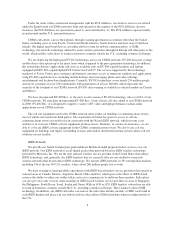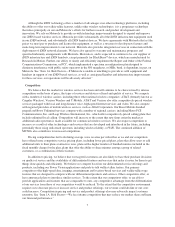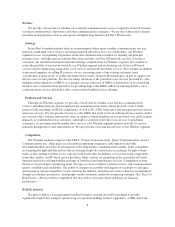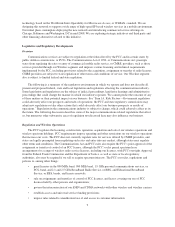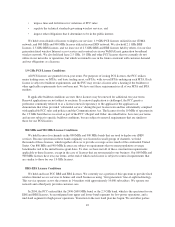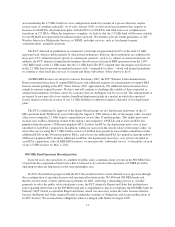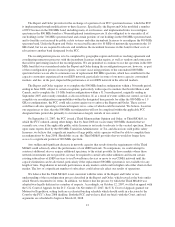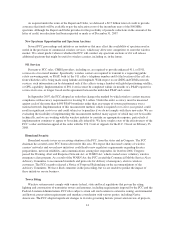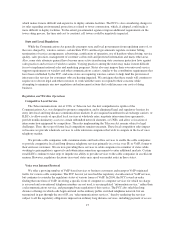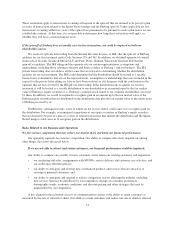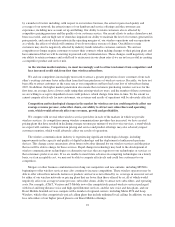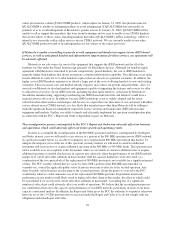Sprint - Nextel 2007 Annual Report Download - page 18
Download and view the complete annual report
Please find page 18 of the 2007 Sprint - Nextel annual report below. You can navigate through the pages in the report by either clicking on the pages listed below, or by using the keyword search tool below to find specific information within the annual report.charges and contributions to the universal service funds, or USF. In addition, the FCC preempted states from
exercising entry and related economic regulation of interconnected VoIP services that require the use of
broadband connections and specialized customer premises equipment and permit users to terminate calls to and
receive calls from the public switched telephone network. However, the FCC’s ruling did not address specifically
whether this form of VoIP is an “information service” or a “telecommunications service,” or what regulatory
obligations, such as intercarrier compensation, should apply. Nevertheless, the FCC requires interconnected VoIP
providers to contribute to the federal USF, offer E911 emergency calling capabilities to their subscribers, and
comply with the electronic surveillance obligations set forth in the Communications Assistance for Law
Enforcement Act, or CALEA. Because we provide VoIP services and transport VoIP-originated traffic, an FCC
ruling on the regulatory classification of VoIP services and the applicability of specific intercarrier compensation
rates is likely to affect the cost to provide these services; our pricing of these services; access to numbering
resources needed to provide these services; and long-term E911, CALEA and USF obligations. Two parties have
recently filed petitions with the FCC seeking forbearance from the intercarrier compensation rules as they apply
to VoIP traffic. These petitions seek opposite results – one petition argues that access charges should not apply to
VoIP traffic, while the other petition argues that access charges should apply. The FCC has at most 15 months to
act on these petitions.
High-speed Internet Access Services
Following a June 2005 U.S. Supreme Court decision affirming the FCC’s classification of cable modem
Internet access service as an “information service” and declining to impose mandatory common carrier regulation
on cable providers, the FCC issued an order in September 2005 declaring that the wireline high-speed Internet
access services, which are provided by ILECs, are “information services” rather than “telecommunications
services.” As a result, over time ILECs have been relieved of certain obligations regarding the provision of the
underlying broadband transmission services. In 2007, the FCC followed this decision with a similar deregulation
of wireless high-speed Internet access services. Such deregulation should result in less regulation of some of our
EV-DO and WiMAX products and services. Deregulation of broadband services, however, has sparked a debate
over “net neutrality” and “open access.” Proponents of “net neutrality” assert that operators of broadband
transmission facilities should not be permitted to make distinctions among content providers for priority access to
the underlying facilities and that networks should be “open” to use by any device the customer chooses to bring
to the network. While we have announced our intention to open the wireless operating platform of our handsets
through our participation with Google in the Open Handset Alliance, an open access or net neutrality mandate
that is not narrowly crafted could adversely affect the operation of our broadband networks by constraining our
ability to control the network and protect our users from harm caused by other users and devices. Additionally,
the FCC has a pending proceeding to consider whether all high-speed Internet access services, regardless of the
technology used, are subject to various FCC consumer protection regulations. The imposition of any such
obligations could result in significant costs to us.
Other Regulations
Truth in Billing and Consumer Protection
The FCC’s Truth in Billing rules generally require both wireline and wireless telecommunications carriers,
such as us, to provide full and fair disclosure of all charges on their bills, including brief, clear, and
non-misleading plain language descriptions of the services provided. In response to a petition from the National
Association of State Utility Consumer Advocates, the FCC found that state regulation of CMRS rates, including
line items on consumer bills, is preempted by federal statute. This decision was overturned by the 11th Circuit
Court of Appeals and the Supreme Court denied further appeal. As a consequence, there may be an increase in
state activities to impose various regulations on the billing practices of wireless carriers. The FCC is continuing
to look at issues of consumer protection, including the use of early termination fees, and the appropriate state and
federal roles. If states gain such authority, or there are other changes in the Truth in Billing rules, our billing and
customer service costs could increase.
16


